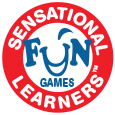 Many young children, especially those with Sensory Processing Disorder (SPD) and Autism Spectrum disorder (ASD), have difficulty identifying, expressing, and coping with their feelings. For parents who witness their struggles, it’s perplexing at best, heartbreaking at worst. Parents want to help, but often don’t know how to start.
Many young children, especially those with Sensory Processing Disorder (SPD) and Autism Spectrum disorder (ASD), have difficulty identifying, expressing, and coping with their feelings. For parents who witness their struggles, it’s perplexing at best, heartbreaking at worst. Parents want to help, but often don’t know how to start. For Claudia Faierman-Shulman, the answer turned out to be having fun, and that turned into creating a new game for children and parents to play together.
Determined to find a way to help her son learn, grow and enjoy a fulfilling life, Ms. Faierman-Shulman plunged herself into the world of special needs. She began attending every conference, workshop and lecture she could find on such topics as Social Skills Training and Sensory Processing. She read voraciously, researched tirelessly, and participated in every therapy session for her son over a period of years. She reached out to leading clinicians for their expertise and support, grateful to meet so many wonderful people with positive attitudes and reassuring knowledge of the world of emotion regulation and self-esteem.
As she gained knowledge and experience, she realized that there were many myths about kids on the autism spectrum. For example, it was commonly thought that kids on the spectrum want to be alone. But she observed that many kids with autism actually want to connect with and play with others, and can enjoy developing meaningful relationships, when given enough support. She also realized that the challenges in communication, social skills, and sensory processing were hindering their ability to interact with peers, often to the point of the child giving up.
We are all social beings regardless of our strengths or impairments, and children on the autism spectrum are no exception. Almost always they are sweet and loving, despite the common belief that children with autism have difficulty relating to others and empathizing with others’ feelings, they can actually be overly sensitive to other people’s feeling and easily affected by the emotions of others (emotional contagion).
Kids with ASD often mirror our own emotions, and deep inside, they may crave the chance to develop friendships and experience feelings of inclusiveness and joy that all children deserve. They want to belong, be loved, and be appreciated. And they want to feel that they are important members of their families.
Parents can connect with their children through love, and understanding, and with joy. How? By simplifying emotion-based concepts, making them easy and fun to practice. By empowering children to understand their feelings, and showing them how to use coping strategies the work on My Feelings began with the lofty goal of finding a way to value families togetherness, while promoting both physical and mental health Learning through play provided a way to accomplish this goal!
Ms. Faierman-Shulman, with her business background, assembled a team of game makers (mostly retired from Hasbro) artists, marketing and development professionals. Based on the goals of 1) having fun 2) creating a way for parents and children to play while learning about emotions, developing self-regulation, self-esteem, and social participation c) providing an extremely inexpensive and effective game, the long journey to research and develop the My Feelings game began.
The game not only identifies emotions, but also provides a way to work on coping and compensation skills around the feelings a child (and their grown-up partner) experience. It has the best qualities of a game for children:
First, it has almost universal applicability; appropriate for most children;
Second, it is really fun (in playing it at STAR center with clients I invariably hear laughter and giggles);
Third, it is positive, focusing on what kids can do!
And last, it is inexpensive, fitting into home, school, and clinic budgets.
My Feelings allows kids to discover what makes them feel Happy, Sad, Angry, Excited, Frustrated, Tired, and Scared. As they play, they learn to recognize emotions in themselves and in others. What I like the most about this game is the fact that it gives parents, teachers, and clinicians valuable insight into what kids are really thinking and really feeling! And it gives kids insights into what their grown-ups are feeling too!
My Feelings meets the goal of bringing joy, understanding, and hope to children and their families, helping kids with disabilities discover a fun world related to self-regulation, and empowering parents to have confidence in themselves and their abilities to help their children to be alert and calm, to acknowledge their feelings, and to develop new coping strategies for stress.
To see a free video clip of me playing My Feelings in my clinic go to https://www.youtube.com/watch?v=8XeXRu_YhpY And learn more about the My Feelings game at http://sensationallearners.ca
***************************************************************************************
My Feelings has been presented to many audiences, including The Geneva Centre for Autism, The STAR Center in Denver, Colorado, The York Region Chapter of The Ontario Association of Speech Language Pathologists and Audiologists, and the Toronto School Board. Read what leading clinicians, therapists and authors have to say about My Feelings: http://sensationallearners.ca/pages/endorsements







